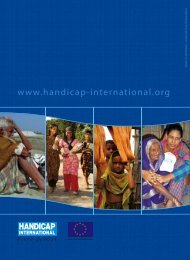Full page photo print - Harvard Law School Project on Disability
Full page photo print - Harvard Law School Project on Disability
Full page photo print - Harvard Law School Project on Disability
You also want an ePaper? Increase the reach of your titles
YUMPU automatically turns print PDFs into web optimized ePapers that Google loves.
• The duty of States to take measures to ensure that pers<strong>on</strong>s with disabilities are included<br />
as recipients of services and programming by those who organize recreati<strong>on</strong>al, tourism,<br />
leisure, and sporting activities.<br />
• The right of pers<strong>on</strong>s with disabilities to access and to use sporting, recreati<strong>on</strong>al and<br />
tourism facilities. This would include sport arenas, community pools, museums,<br />
cinemas, hotels, and other facilities.<br />
• The right of children with disabilities to play and to participate in recreati<strong>on</strong>, leisure and<br />
sporting activities in the school system. This also includes access to playgrounds in the<br />
community and adaptive physical educati<strong>on</strong> in schools.<br />
In summary, States have the obligati<strong>on</strong> to respect, protect and fulfill the rights of people with<br />
disabilities to participate in cultural life, recreati<strong>on</strong>, leisure, sport, and play. In meeting their<br />
obligati<strong>on</strong> to respect the rights of people with disabilities. States must refrain from limiting or<br />
interfering with the access of people with disabilities to exercise their rights to access sporting<br />
and recreati<strong>on</strong>al venues, use their own language, such as sign language, and otherwise<br />
participate in cultural activities. States must also refrain from enforcing discriminatory practices<br />
as State policy and must not impose discriminatory practices relating to cultural life, such<br />
as restricting or limiting the use of sign language. Obligati<strong>on</strong>s to protect include, am<strong>on</strong>g<br />
other things, the duties of States to adopt all appropriate legislative, administrative, and<br />
other measures to facilitate the enjoyment of cultural, recreati<strong>on</strong>, sporting, and leisure rights.<br />
Examples include providing sign language interpretati<strong>on</strong> for a cultural event or building public<br />
sporting arenas without physical barriers. Finally, the obligati<strong>on</strong> to fulfill requires States to,<br />
am<strong>on</strong>g other things, undertake measures to fully implement rights. States Parties to CRPD<br />
must, for example, ensure the appropriate training of those involved in the organizati<strong>on</strong> of<br />
recreati<strong>on</strong>, tourism, leisure, and sporting opportunities.<br />
disability and the Arts: Principles for inclusi<strong>on</strong><br />
• Every young pers<strong>on</strong> with a disability deserves access to high quality arts learning<br />
experiences;<br />
• All art educators should be prepared to include students with disabilities in their<br />
instructi<strong>on</strong>;<br />
• All children, youth, and adults with disabilities should have complete access to<br />
cultural facilities and activities;<br />
• All individuals with disabilities who aspire to careers in the arts should have the<br />
opportunity to develop appropriate skills. 4<br />
4 “Access and Opportunities: A Guide to <strong>Disability</strong> Awareness.” VSA Arts. http://www.vsarts.org<br />
PART 2: The c<strong>on</strong>venTi<strong>on</strong> <strong>on</strong> The RighTs of PeRs<strong>on</strong>s wiTh disAbiliTies<br />
181




